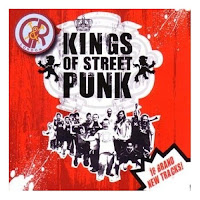 Street punk is a working class subgenre of punk rock which took shape in the early 1980s, partly as a rebellion against the increasingly artistic pretensions of the first wave of English punk.[1]. Street punk emerged from the Oi! style typified by UK bands like Sham 69 and Cockney Rejects (whose song "Oi! Oi! Oi!" served as a namesake for the genre).[2][3] However, street punk continued beyond the confines of the original Oi! form. Street punks generally have a much more outlandish appearance than the working class or skinhead image cultivated by Oi! groups.
Street punk is a working class subgenre of punk rock which took shape in the early 1980s, partly as a rebellion against the increasingly artistic pretensions of the first wave of English punk.[1]. Street punk emerged from the Oi! style typified by UK bands like Sham 69 and Cockney Rejects (whose song "Oi! Oi! Oi!" served as a namesake for the genre).[2][3] However, street punk continued beyond the confines of the original Oi! form. Street punks generally have a much more outlandish appearance than the working class or skinhead image cultivated by Oi! groups.
Street punk music is characterized by two main musical aspects: single note guitar lines and short solos. Unlike similar genres such as hardcore punk, street punk bands often contain two guitarists, one of which plays guitar melodies while not singing. Street punk also makes frequent use of gang vocals and sing–along choruses, one of the many aspects the genre borrows from Oi!. The lyrics to most street punk songs often feature condemnation or praise of acts of violence, drinking and drug use, partying, inner-city turmoil, or personal politics.[4] Street punk groups sometimes express political viewpoints, of either a left- or (less frequently) right-wing variety, though street punks often eschew politics altogether in favor of a more hedonistic, nihilistic outlook. The typical dress for a street punk usually follows the DIY ethic of self-made clothing, hand-sewn patches, studs and spikes, and otherwise altered clothing. Hairstyles often include unnatural coloration, liberty spikes, and mohawks.
History
1970s street punk was essentially synonymous with Oi! and entirely British, performed by bands such as Sham 69, the Angelic Upstarts and the Cockney R ejects. Street punk began to distinguish itself from Oi! with the development of the UK 82 sound of The Exploited, Discharge, Charged GBH and Anti-Nowhere League.[citation needed] These bands were somewhat influenced by the New Wave of British Heavy Metal – particularly Motörhead. The D-beat style emerged from this scene.[citation needed]
ejects. Street punk began to distinguish itself from Oi! with the development of the UK 82 sound of The Exploited, Discharge, Charged GBH and Anti-Nowhere League.[citation needed] These bands were somewhat influenced by the New Wave of British Heavy Metal – particularly Motörhead. The D-beat style emerged from this scene.[citation needed]
The California band Rancid became the most commercially successful street punk band, mixing in elements of ska punk, pop punk, hardcore punk and eventually dancehall and hip hop. Other prominent 1990s street punk groups included Anti-Flag, The Casualties, The Unseen, A Global Threat and Dropkick Murphys.


No comments:
Post a Comment